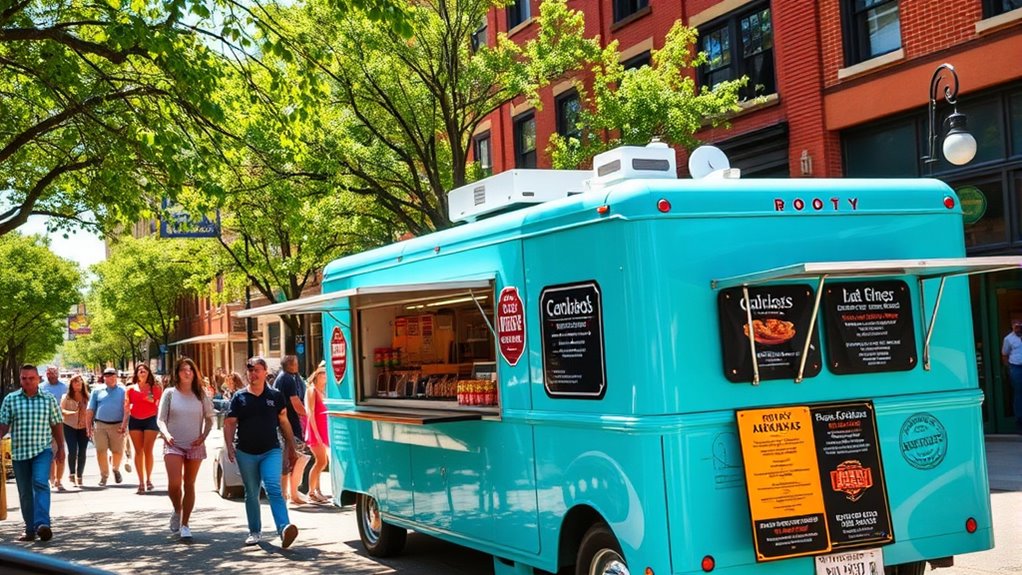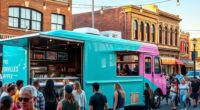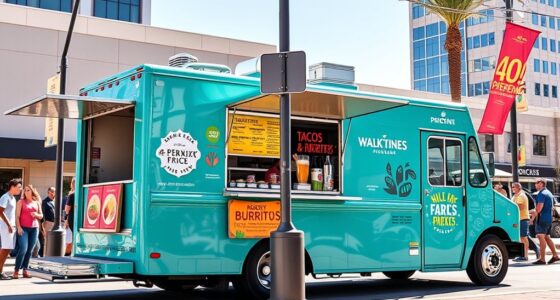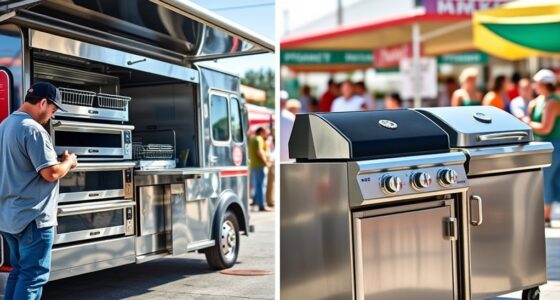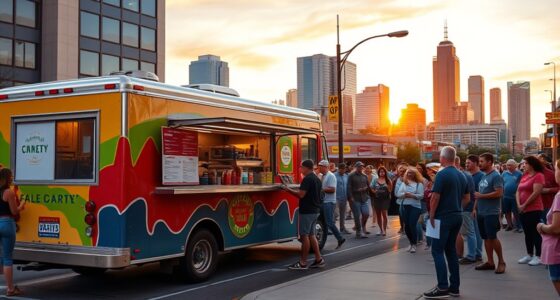To open a food truck in Hot Springs, Arkansas, you’ll need permits from the Arkansas Department of Health and your local municipality, costing around $1,864 to $28,000 overall. Choose busy locations like downtown, parks, or food truck courts, and develop a safe, appealing menu with local ingredients. Focus on marketing through social media, community events, and partnerships. For detailed steps and tips, continue exploring how to make your food truck venture thrive in Hot Springs.
Key Takeaways
- Obtain necessary permits from the Arkansas Department of Health and local city licenses, including food service and business permits.
- Budget for vehicle costs ($35,000–$150,000+), equipment ($50,000–$60,000), and permits ($1,864–$28,000 nationwide).
- Select high foot traffic locations such as downtown Hot Springs, food truck parks, and event sites for maximum visibility.
- Develop a safe, appealing menu with local ingredients, clear labels, and options for diverse dietary preferences.
- Engage community through social media, local events, and collaborations, and ensure compliance with all legal and tax requirements.
Navigating Permit Requirements and Approval Processes
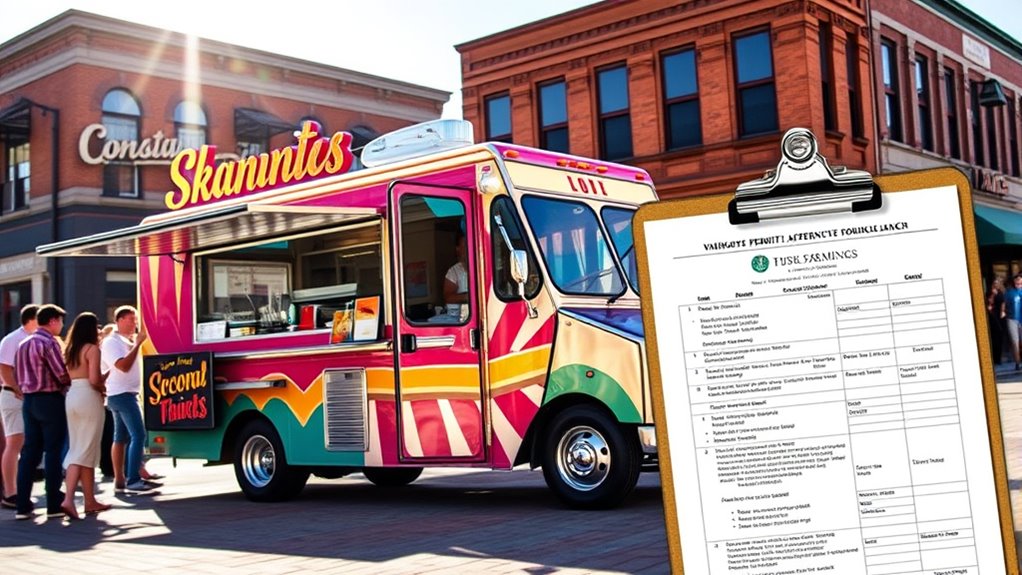
Managing the permit requirements and approval processes for operating a food truck in Hot Springs, Arkansas, involves understanding multiple agencies and steps. You’ll need a food service permit from the Arkansas Department of Health (ADH) if you handle temperature-sensitive foods. Additionally, you must obtain a business permit from the local municipality or county, which requires signatures from several departments, including ADH approval. Register for the local Advertising & Promotion (A&P) tax with the city clerk’s office. Your food truck must operate in designated food truck parks, as per city regulations. To get approved, submit a retail food plan review to ADH, and coordinate with city zoning and licensing departments. Keep all permits current, display them visibly, and retain copies for inspections. Incorporating positive thinking strategies into your planning can help you navigate unexpected challenges during the permitting process.
Estimating Costs to Launch Your Food Truck Business
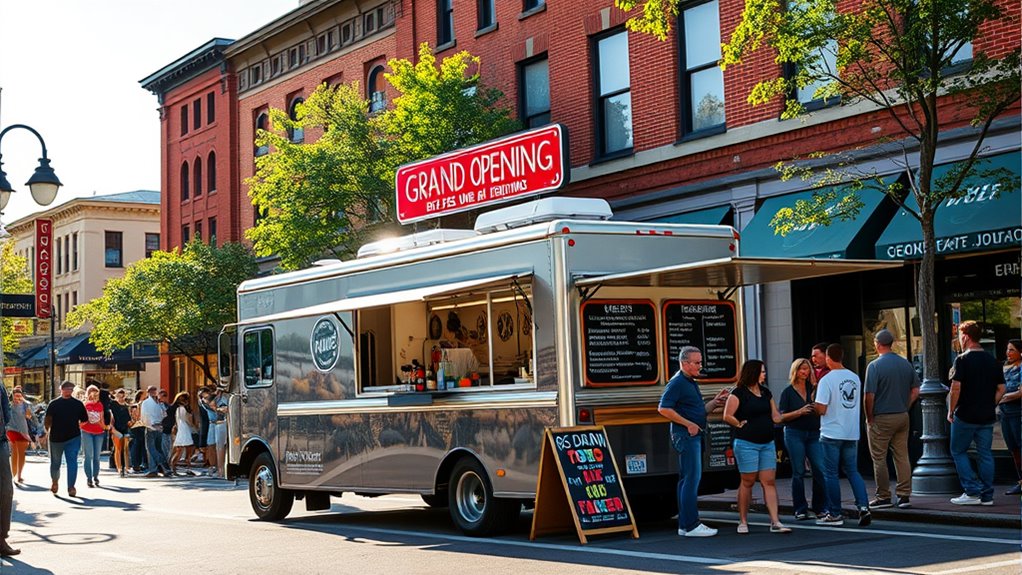
Launching a food truck business in Hot Springs requires a clear understanding of the costs involved. You’ll need to budget for vehicle purchase or retrofit, which can range from $35,000 for used trucks to over $150,000 for new, customized models. Equipping your truck with kitchen appliances adds thousands more, typically $50,000 to $60,000, but customization can push costs up to $260,000. Permits, licenses, and legal fees vary, averaging around $1,864 to over $28,000 nationwide, including Arkansas-specific costs. Initial inventory, supplies, and marketing expenses also add up. Researching local permit requirements early can help avoid costly delays and ensure compliance from the start. Developing a comprehensive business plan will help you better estimate expenses and secure funding if needed.
- Vehicle and equipment costs influence your setup speed and quality
- Permits and legal fees are ongoing concerns, not just startup costs
- Inventory planning prevents waste and controls expenses
- Effective branding and marketing attract customers and boost revenue
Choosing Prime Locations in Hot Springs
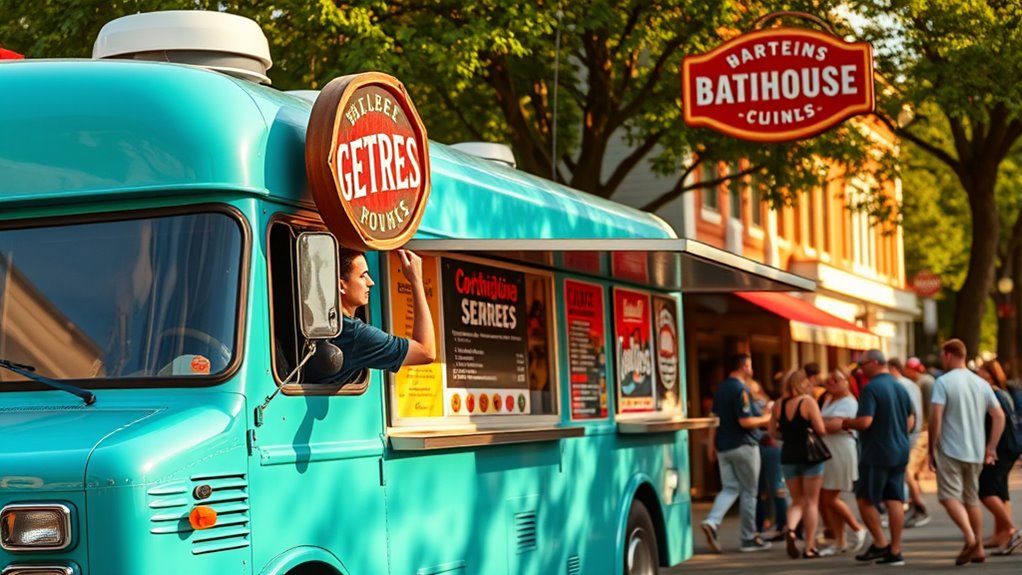
To maximize your sales, focus on high foot traffic areas like downtown or near popular attractions. Food truck parks and shared zones can boost visibility and reduce parking hassles, making it easier for customers to find you. Don’t forget to explore event permits for festivals and special gatherings to tap into seasonal crowds. Additionally, for more options, consider checking out food truck locations near Hot Springs, AR, which can help identify busy spots and regional hotspots to attract more customers. Exploring location-based content trends on platforms like TikTok can also boost your marketing efforts and attract a broader customer base.
High Foot Traffic Areas
Choosing prime locations with high foot traffic is essential for a food truck’s success in Hot Springs. Central Avenue, the main commercial and tourist hub, sees nearly 100% parking occupancy during peak times, indicating heavy pedestrian and vehicle flow. Its proximity to Hot Springs National Park and attractions like Oaklawn Racing & Gaming make it a prime spot for capturing tourists and locals alike. Seasonal events and ongoing revitalization efforts boost foot traffic, creating consistent opportunities. Citywide foot traffic data shows increasing trends in recent years, supporting strategic location choices. Additionally, understanding the pedestrian density in these areas can help optimize placement for maximum visibility and sales.
- High visibility on busy arterial routes ensures more passing customers
- Near popular attractions boosts tourist footfall
- Downtown districts with shops, nightlife, and cultural sites extend customer hours
- Strong pedestrian zones foster longer dwell times and impulse buys
Food Truck Parks Zone
Food truck parks in Hot Springs offer strategic advantages for location selection by creating centralized hubs that attract steady crowds. Places like 70 West Food Court at Airport Rd. and 420eats Food Truck Court on Malvern Avenue draw diverse customers with a variety of cuisines, amenities, and entertainment. These parks increase foot traffic, boost dwell time, and encourage repeat visits through covered seating, picnic areas, and family-friendly features. Hosting live music and outdoor games at parks like 420eats further enhances the customer experience and attracts broader crowds. Proximity to major roads, recreational areas like Hot Springs Marina, and downtown hotspots makes these locations highly visible and accessible. Selecting a food truck park with strong amenities and entertainment options can notably grow your customer base and sales. Food truck parks in Hot Springs create a vibrant, communal atmosphere that encourages socialization and repeat visits. Incorporating strategic location selection can maximize visibility and customer engagement, ultimately boosting your business success.
Event Permit Opportunities
Event permit opportunities in Hot Springs open up unique ways to showcase your food truck at popular gatherings and festivals. These permits let you operate at city-sanctioned events with large crowds, like festivals, fairs, and markets. Choosing the right location is key—look for spots with high foot traffic, such as downtown during seasonal festivals or recreational areas hosting celebrations. City-sponsored sites often provide infrastructure, including electricity and waste disposal, easing your setup. Remember, these permits exclude private events unless arranged separately. To maximize success, consider locations with easy access to power, water, and waste management, and stay aligned with city schedules and policies. Proper planning ensures visibility, safety, and compliance, helping your food truck thrive at these prime event spots. Additionally, selecting locations with appropriate facilities can improve operational efficiency and customer satisfaction.
Developing a Safe and Appealing Menu
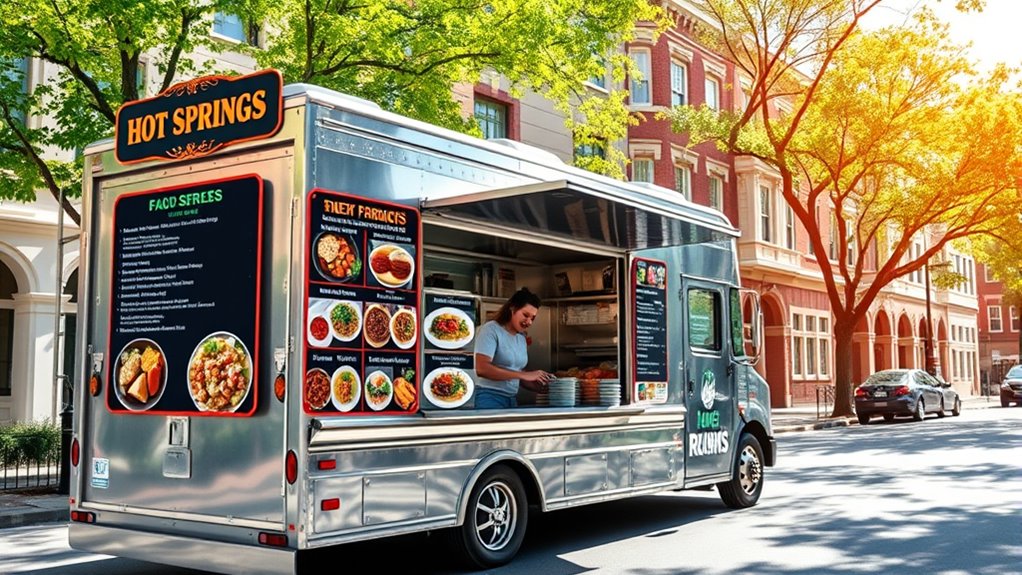
Creating a safe and appealing menu starts with selecting items that meet food safety standards and are easy to prepare on your truck. You’ll want a mix of popular favorites and signature dishes to attract a diverse crowd. Keep your offerings simple and clearly labeled to guarantee a smooth, safe dining experience for your customers. Additionally, it is important to develop recipes that comply with state and federal regulations, including proper labeling and ingredient disclosure. Ensuring your menu reflects the farmhouse-inspired aesthetic can also enhance customer appeal and create a memorable dining experience.
Menu Item Safety Standards
Developing a safe and appealing menu for your food truck requires careful attention to menu item safety standards. You must source ingredients from approved suppliers and store them properly to prevent contamination. Foods that need refrigeration or cooking must follow strict safety protocols, including GMPs, to reduce foodborne illness risks. Using standardized recipes tested in inspected facilities ensures consistent safety and quality. Additionally, you should:
- Ensure all ingredients and menu items meet state and local safety regulations
- Maintain proper storage and handling to prevent cross-contamination
- Use food safety-certified staff trained in proper hygiene and procedures
- Keep detailed temperature logs and regularly calibrate equipment
- Regularly inspect all ingredients and prepared foods for signs of spoilage or contamination to maintain safety standards
Following these standards not only protects your customers but also keeps your operation compliant and efficient.
Balanced and Appealing Offerings
A balanced and appealing menu combines diverse flavors, dietary options, and seasonal choices to attract a wide range of customers. Incorporate authentic, culturally rich dishes tied to traditional recipes, and share their stories on menus or social media to deepen connections. Offer a mix of savory and sweet items—think street food staples alongside desserts like churros or funnel cakes—to boost appeal. Include globally inspired dishes with local twists to stand out without relying solely on fusion trends. Guarantee your menu caters to health-conscious patrons by adding vegetarian, vegan, and plant-based options. Rotate seasonal items and highlight local ingredients to keep offerings fresh and relevant. Clear labels for dietary needs and sustainable practices help customers make informed choices, fostering loyalty and trust. Diverse menu options, including vegetarian and vegan choices, can attract a broader customer base and cater to various dietary restrictions. Additionally, understanding financial management principles such as cost control and pricing strategies can ensure your menu remains profitable and sustainable over time.
Crafting Effective Marketing Strategies in Hot Springs
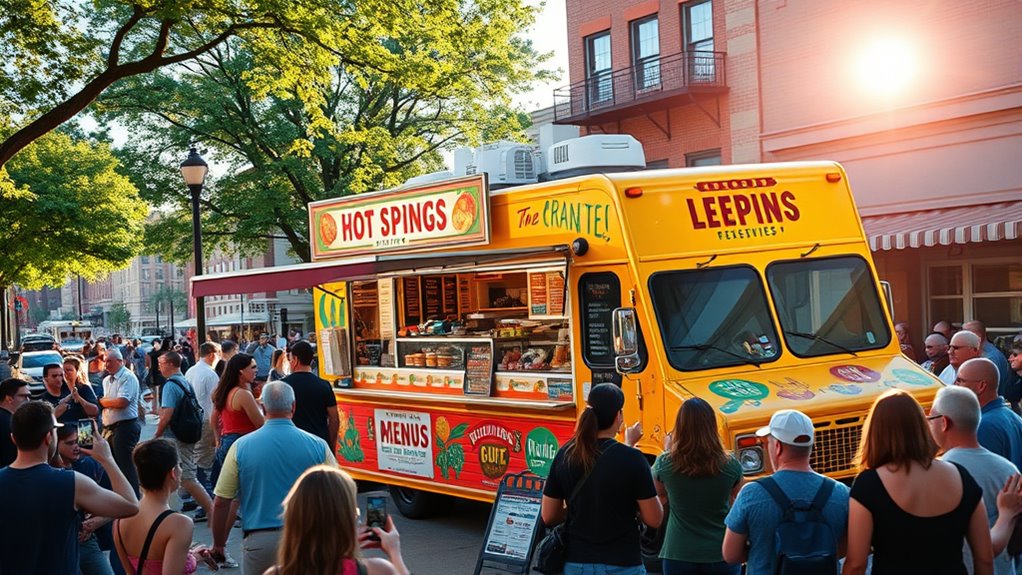
To stand out in Hot Springs’ vibrant food scene, you need a targeted marketing approach that leverages local connections and digital tools. Engage local food bloggers and influencers with complimentary tastings to boost your visibility. Authentic experiences shared by trusted personalities generate FOMO and deliver up to 11 times higher ROI than traditional campaigns. Build relationships with culinary enthusiasts and craft an outreach program that encourages sharing content across platforms. Implementing a strong social media presence can significantly amplify your reach and engagement. – Collaborate with local businesses and breweries to access new customer bases. – Participate in community events and festivals to increase brand awareness. – Design seasonal menus and themed promotions to keep customers engaged year-round. – Optimize your online presence with a mobile-friendly website, SEO, and shareable content. Additionally, leveraging targeted marketing strategies can help you connect more effectively with your desired audience and foster long-term loyalty.
Ensuring Legal and Tax Compliance
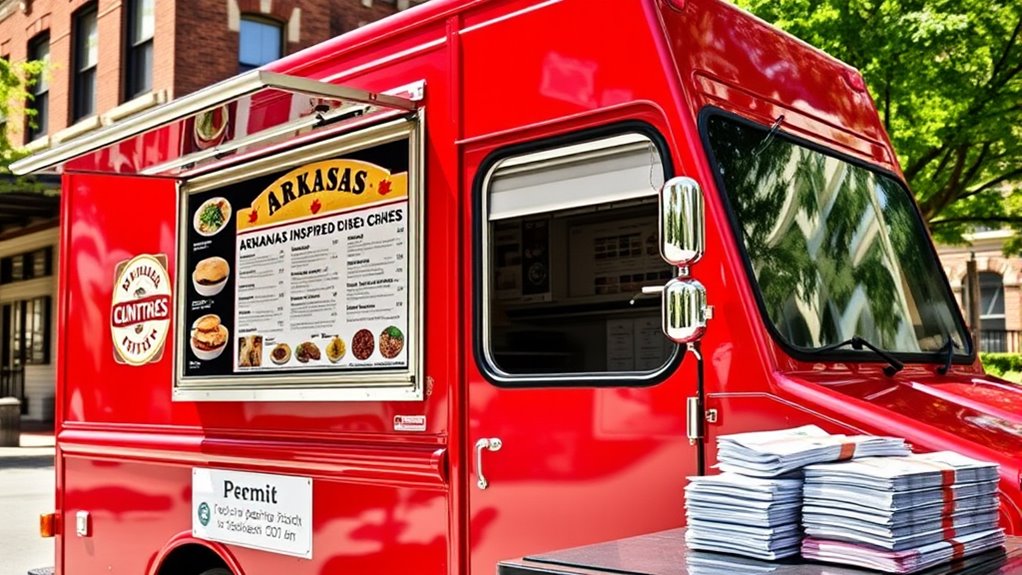
Ensuring legal and tax compliance is essential for operating a food truck smoothly in Hot Springs. You need to obtain a business permit from the city and a license aligned with Arkansas State Board of Health regulations. Food trucks must operate exclusively in designated food truck parks—operating outside these zones isn’t allowed. Before starting service, you must pass a health inspection and have waste disposal agreements with city-approved haulers. Certified food safety training for your staff and regular health inspections are mandatory to maintain sanitation standards. You’re also responsible for registering with the Arkansas Department of Finance and Administration for sales tax collection and paying all applicable local and state taxes on time. Staying compliant with zoning, licensing, and health regulations keeps your operation legal and avoids penalties. Additionally, understanding home furnishings safety standards, such as ensuring electrical equipment like heated mattress pads are used properly, can help prevent safety violations related to electrical hazards or fire risks in your food truck setup.
Tips for Successful Food Truck Operations in Hot Springs
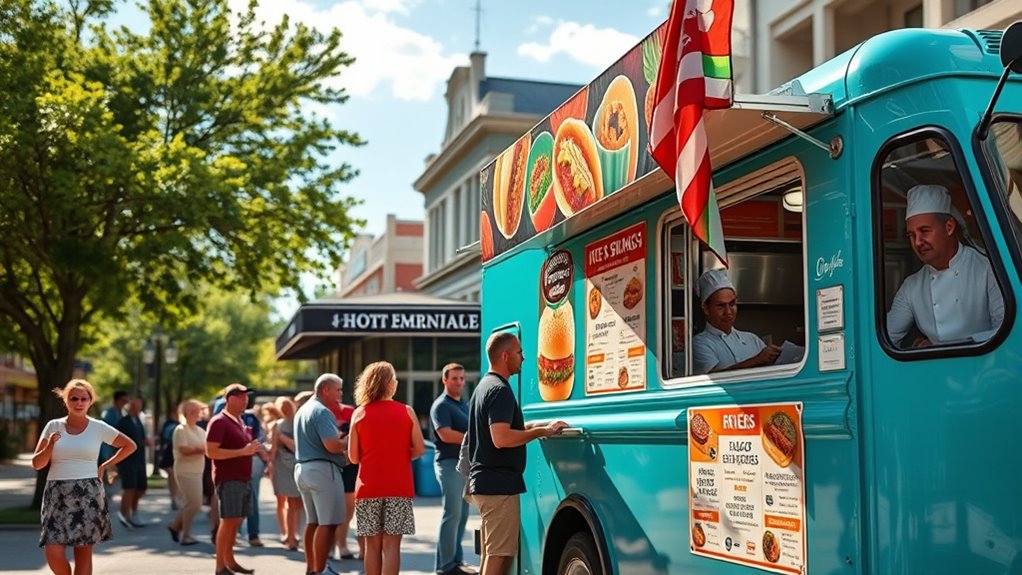
Successful food truck operations in Hot Springs hinge on strategic location choices and active event participation. You need to pick spots with high foot traffic, like popular parks, food truck courts, or busy districts, and regularly rotate locations to reach diverse customers. Engaging with local events such as festivals and university functions can boost visibility and sales. To stand out, develop a menu that travels well, features signature items, and appeals to local tastes. Focus on sourcing ingredients locally to support the community, promote freshness, and reduce costs. Utilize social media and local media outlets to spread the word about your location and specials. Participating in local events and highlighting collaborations with farms can strengthen your brand and foster community goodwill.
Frequently Asked Questions
What Are the Specific Zoning Restrictions for Food Trucks in Hot Springs?
You need to know that Hot Springs requires food trucks to operate only within designated food truck parks, which must be the primary use of the site. Running a food truck as an accessory on other properties isn’t allowed. The zoning ordinance, effective March 1, 2025, enforces these rules through detailed application processes. Violating these restrictions can lead to enforcement actions, so verify your operations stay within the designated parks and comply with all permit requirements.
How Do I Find Approved Commissary Kitchens Nearby?
Imagine walking into a bustling, fully equipped kitchen with gleaming appliances and ample storage. To find approved commissary kitchens nearby, start by exploring online directories like TheKitchenDoor.com or Arkitchen. Contact local food incubators, health departments, or small business programs to confirm licensing and compliance. Reach out directly to these facilities, tour the space, and clarify costs, so your food truck can operate smoothly from a trusted, legal kitchen.
What Are the Peak Seasons for Food Truck Sales in Hot Springs?
You’ll find that the peak seasons for food truck sales in Hot Springs are from late spring to early fall, mainly May through September. During this time, warmer weather, outdoor events, and festivals attract more tourists and locals, boosting your sales. Special holiday weekends like Memorial Day and Labor Day also see increased customer traffic. Take advantage of these busy periods by planning your menu and marketing strategies accordingly.
Can I Sell Alcohol From My Food Truck Legally in Hot Springs?
You can sell alcohol from your food truck in Hot Springs, but it’s complicated. You need specific permits, including a retail liquor permit for off-premise sales, which costs $200 annually. Food trucks aren’t automatically eligible, so you’ll likely need to meet restaurant criteria and follow strict regulations. Temporary permits are available for special events. Make sure you comply with all state and local laws to avoid fines or license revocation.
What Insurance Coverage Is Recommended for a Food Truck Business?
Think of insurance as the sturdy shield protecting your food truck’s journey. You’ll need general liability to guard against mishaps, and a business owner’s policy for all-encompassing coverage. Don’t forget workers’ comp if you have staff, and commercial auto insurance to cover your truck on the road. Equipment coverage keeps your tools safe, while product liability shields you from food-related claims. These protections keep your business steady amidst life’s unpredictable gusts.
Conclusion
Launching your food truck in Hot Springs is like planting a seed—you’ll need patience, planning, and a sprinkle of passion. By steering permits, choosing prime spots, and crafting a mouthwatering menu, you’ll set the stage for success. With smart marketing and legal compliance, your food truck will stand tall like a beacon of flavor in the heart of Hot Springs. Get ready to turn your culinary dreams into a delicious reality!
